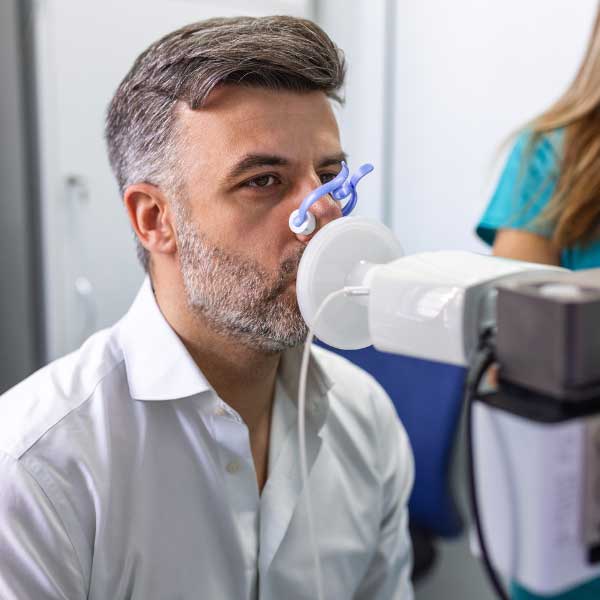
There are certain measurements spirometry alone can’t take, such as the amount of air that stays in your lungs after you’ve exhaled. So, we use other techniques to measure these amounts — or volumes — which can help figure out how well your lungs are functioning.
What is Measurement of Lung Volumes?
This test can check to see if your lungs have sustained damage due to your work or home environment, lifestyle habits or past or current health conditions. If you have a chronic disease and are receiving treatment, lung volume measurements can track effectiveness and determine if a change is needed.
Plethysmography
Lung volume measurements can include plethysmography, which calculates volume through pressure. During plethysmography, you’ll sit inside a transparent tube and breathe into a mouthpiece connected to a machine. The pressure in the tube and at your mouth will then be measured.
Nitrogen Washout
Another technique for measuring lung volume is nitrogen washout, which calculates volume by how much nitrogen stays in your lungs. During this test, you’ll breath in 100% oxygen for a short amount of time until nitrogen is “washed out” of your lungs. The remaining nitrogen you exhale will then be measured.
How to Prepare for Your Test
It’s important to:
Stop smoking at least one hour before your test
Avoid drinking alcohol at least four hours before
Wear loose clothing to allow for chest expansion (no tight belt or vest)
Avoid having a large meal two hours prior to your test
Your appointment may be rescheduled if you haven’t prepared according to these criteria.
Call us ahead of time if you:
Have an inability to follow instructions*
Have had a heart attack in the last month
Have chest or abdominal pain
Have excessive pain while using a mouthpiece
Have stress incontinence, or an unintentional loss of urine during movement or physical activity
Have had recent eye surgery (1 week to 6 months, depending on surgery)
Have had recent brain surgery or an injury (3 to 6 weeks)
Have had a collapsed lung (2 weeks)
Are spitting up blood
*If a patient is unable to follow instructions due to a confused state, young age or dementia, then a parent, caregiver or guardian may call on their behalf.
Need More Information?

The American Thoracic Society provides information on pulmonary function tests:
If you have any questions about your test, please call us:
Adult Testing
Pediatric Testing
For your health information, including access to medical records, lab results and bill pay, download our MyHealthMate app today.
We use cookies and other tools to optimize and enhance your experience on our website. View our Privacy Policy.

